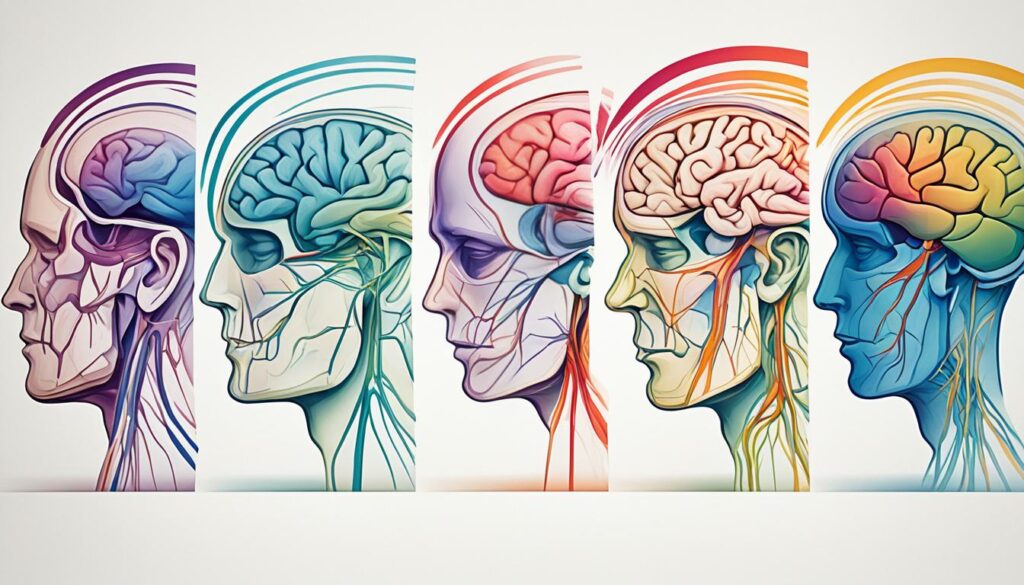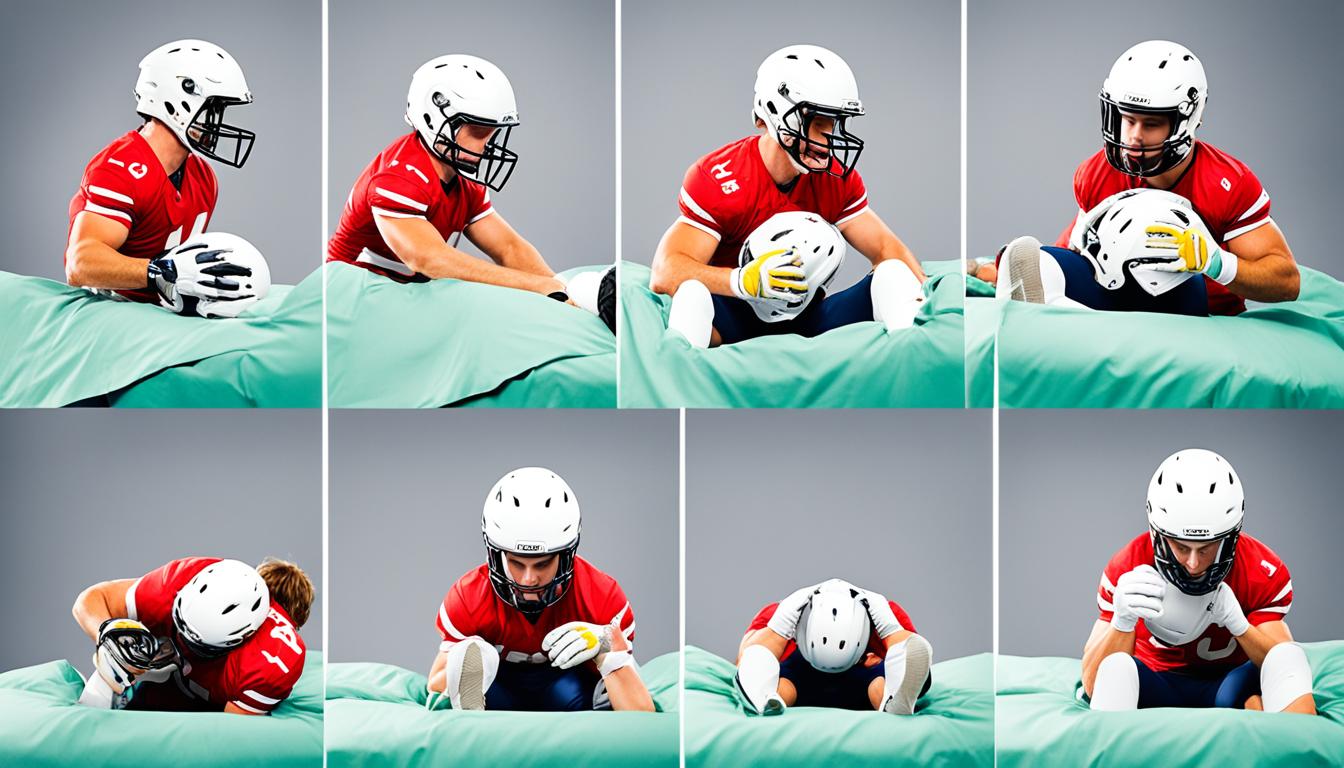Did you know that approximately 80% of concussed patients recover in 10 days or less? However, for those experiencing persistent symptoms, a more comprehensive approach to concussion recovery is necessary. Recovering from a concussion is a unique and individual process, with each person experiencing different timelines and challenges along the way. In this article, we will explore the 6 stages of concussion recovery, providing valuable insights and guidelines to help you achieve a safe and healthy recovery.
Key Takeaways:
- Recovering from a concussion differs for each person
- 80% of concussed patients recover in 10 days or less
- A comprehensive approach is needed for persistent symptoms
- The six stages of concussion recovery provide a roadmap for recovery
- Understanding these stages helps in achieving a safe and healthy recovery
Comprehending Concussion: Definition, Causes, and Immediate Action
Before delving into the stages of concussion recovery, it is essential to understand what a concussion is and its immediate impact. A concussion is a form of traumatic brain injury that occurs when a strong force causes the head and brain to move rapidly back and forth. This sudden movement disrupts the brain’s normal function and can lead to various symptoms. Concussions are commonly caused by falls, car accidents, sports-related injuries, and physical altercations.
When a concussion occurs, it is crucial to take immediate action by seeking medical attention and avoiding further physical activity to prevent exacerbating symptoms and further injury.
With a visual representation of the brain highlighting the areas affected by a concussion, it becomes easier to comprehend the impact and severity of this type of injury.
6 Stages of Concussion Recovery
Recovering from a concussion is a process that involves several stages, each crucial for a successful recovery. By understanding these stages, individuals can navigate their concussion recovery journey effectively. Let’s explore the 6 stages of concussion recovery:
Initial Impact and Acute Phase Management
The initial impact and acute phase of concussion management are vital for laying the foundation of recovery. During this stage, it is essential to provide the brain with rest and reduce any potential stressors. Physical rest and cognitive quiescence are key, allowing the brain to heal and mitigate further damage. This phase sets the stage for the subsequent stages of recovery.
Importance of Physical Rest and Cognitive Quiescence
Physical rest after a concussion is essential to facilitate the healing process. Engaging in activities that may strain the brain or body can hinder recovery and prolong symptoms. By giving the brain and body ample rest, individuals can optimize the healing process and reduce the risk of symptom exacerbation.
In addition to physical rest, cognitive quiescence is equally important. This involves limiting mental activities that require significant concentration, such as studying, working, or engaging in mentally demanding tasks. Providing cognitive rest allows the brain to heal without additional strain, promoting a faster recovery.
Monitoring for Post-Concussion Syndrome Onset
Post-concussion syndrome (PCS) refers to the persistence of symptoms beyond the initial recovery phase. Monitoring for the onset of PCS is crucial as symptoms may appear days, weeks, or even months after the injury. Regular check-ins with healthcare professionals help identify any signs of PCS, ensuring timely intervention and appropriate management.
Therapeutic Interventions and Gradual Physical Reintegration
Therapeutic interventions play a significant role in concussion recovery. These interventions can include physical therapy, occupational therapy, vestibular therapy, and cognitive rehabilitation. They aim to address specific symptoms and restore function in both the brain and body.
In addition to therapeutic interventions, gradual physical reintegration is necessary to safely return to daily activities and sports. Slowly increasing the level of physical exertion under the guidance of healthcare professionals helps individuals regain their pre-injury capabilities while minimizing the risk of symptom recurrence.
Navigating the Path to Normalcy: Resuming Daily Life
Resuming daily life after a concussion involves finding a balance between recovery and engaging in normal activities. It is important to gradually reintegrate into work, school, and social activities while being mindful of any lingering symptoms. Making necessary adjustments and seeking support from healthcare professionals and loved ones can help individuals navigate the path to normalcy and regain a fulfilling routine.

Identifying Concussion Symptoms and When to Seek Help
Recognizing concussion symptoms is crucial for timely intervention and recovery. While immediate symptoms like headaches, dizziness, and confusion are common, it is also important to be aware of delayed symptoms that may appear after the initial impact. Symptoms of a concussion can vary depending on the individual and the severity of the injury. Some common signs of a concussion include:
- Headache or pressure in the head
- Nausea or vomiting
- Dizziness or lightheadedness
- Blurred or double vision
- Sensitivity to light or noise
- Confusion or difficulty concentrating
- Memory problems
- Changes in mood or behavior
If you or someone you know experiences any of these symptoms after a head injury, it is important to seek medical help. A healthcare professional will be able to assess the situation, provide a proper diagnosis, and recommend appropriate treatment.
Recognizing Delayed Concussion Symptoms
In addition to immediate symptoms, concussion symptoms can sometimes appear or worsen hours or even days after the initial injury. These delayed symptoms may include:
- Fatigue or sleep disturbances
- Difficulty with balance or coordination
- Problems with concentration or memory
- Changes in mood or behavior
- Increased sensitivity to light or noise
- Persistent headaches
It is important to be vigilant and monitor for these delayed symptoms, as they may indicate a more serious concussion. If any of these symptoms worsen or persist, seek medical attention immediately.
Navigating Post-injury Care and Monitoring
After sustaining a concussion, it is crucial to follow proper post-injury care and monitoring guidelines. This includes:
- Resting and avoiding physical activity that may worsen symptoms
- Getting plenty of sleep and maintaining a regular sleep schedule
- Avoiding activities that require intense concentration or mental effort
- Avoiding screens, bright lights, and loud noises as much as possible
- Gradually returning to normal activities and resuming daily routines
Monitoring symptoms closely is also essential during the recovery process. If symptoms worsen or fail to improve, it is important to consult with a healthcare professional for further evaluation and guidance.
Understanding the Role of Medical Professionals in Recovery
Medical professionals play a vital role in the recovery of individuals with a concussion. They provide comprehensive assessments to evaluate the severity of the injury and monitor symptom progression over time. Additionally, they guide treatment plans tailored to the individual’s specific needs and circumstances.
During the recovery process, medical professionals may recommend a variety of interventions, including:
- Cognitive therapy to address difficulties with memory, concentration, or other cognitive functions
- Physical therapy to help restore balance, coordination, and strength
- Medications to manage symptoms such as headaches or sleep disturbances
- Referrals to specialists, such as neurologists or neuropsychologists, for further evaluation and care
Working closely with medical professionals ensures that individuals receive appropriate care and support throughout their concussion recovery journey.
Indispensable Role of Specialized Care in Concussion Therapy
Specialized care plays a crucial role in the comprehensive treatment and recovery of individuals suffering from concussions. When it comes to concussion therapy, addressing the unique needs of patients requires a multidisciplinary approach involving a team of dedicated specialists, therapists, and caregivers. This collaborative effort ensures that patients receive the specialized support and treatment they need to facilitate a successful recovery.
Concussion rehabilitation involves various therapeutic interventions, including cognitive and physical therapy. These targeted interventions are designed to address the specific challenges faced by individuals with concussions, such as cognitive difficulties, physical limitations, and emotional distress. Through dedicated rehabilitation programs, patients can regain their cognitive abilities, improve their physical functionality, and overcome the emotional impact of concussions.
By seeking specialized care, individuals have access to professionals who have the expertise and knowledge to guide them through the recovery process. These specialists understand the complexities of concussions and can tailor treatment plans to each patient’s unique situation. They provide guidance, support, and reassurance, making patients feel empowered and confident in their journey towards recovery.
Receiving specialized care for concussion therapy is essential for ensuring a successful recovery. By focusing on targeted treatment, rehabilitation, and therapy, specialized care significantly improves the chances of a full recovery and helps individuals regain their quality of life. With the right support and interventions, patients can navigate the challenges of concussion rehabilitation and ultimately return to their normal routines.

| Treatment Benefits | Specialized Care |
|---|---|
| Comprehensive assessment | ✔ |
| Targeted rehabilitation | ✔ |
| Individualized treatment plans | ✔ |
| Expert guidance and support | ✔ |
| Improved chances of full recovery | ✔ |
Conclusion
In conclusion, understanding the 6 stages of concussion recovery is vital for individuals navigating the recovery process. Each stage plays a crucial role in achieving a safe and healthy recovery, from managing the initial impact and acute phase to gradually reintegrating into daily life. By following these stages and receiving the necessary support, individuals can recover from a concussion and resume their lives, both physically and mentally.
Recognizing concussion symptoms and seeking appropriate medical help are essential steps in the recovery journey. It is important to be aware of the immediate symptoms that may manifest after a concussion and to also recognize delayed symptoms that may appear later on. Timely intervention and appropriate medical care can greatly contribute to a successful recovery.
Additionally, accessing specialized care is crucial for maximizing the effectiveness of concussion therapy. By collaborating with a multidisciplinary team of specialists and therapists, individuals can receive targeted treatment and rehabilitation that caters to their specific needs. Specialized care focuses on restoring cognitive and physical abilities, providing comprehensive support, and facilitating a successful recovery.




